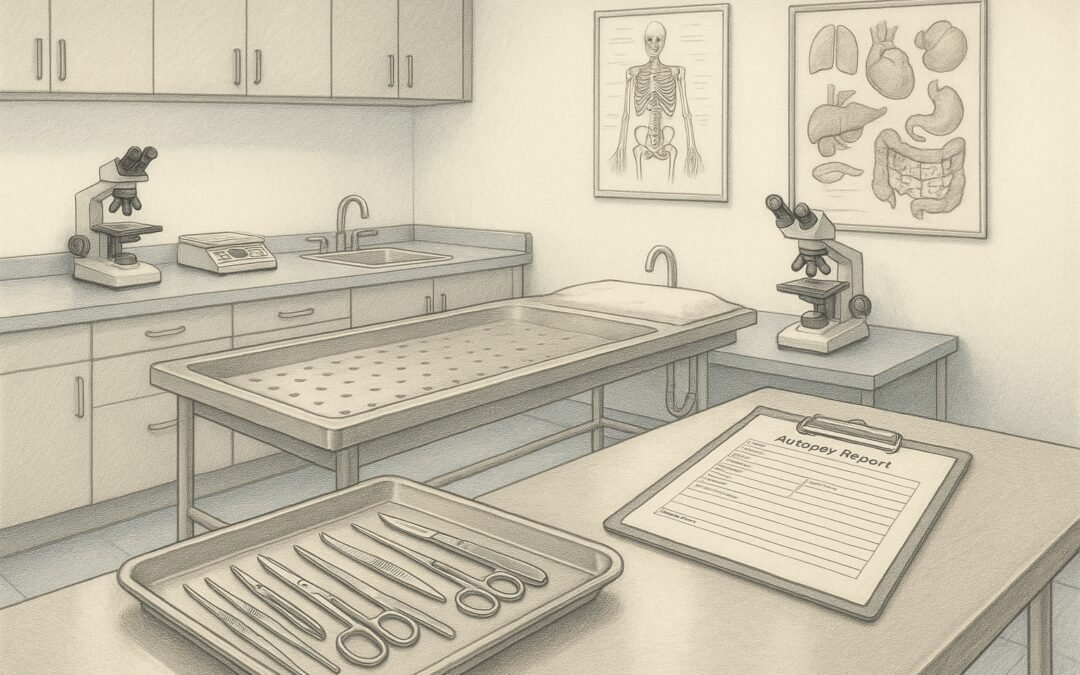She stared at the official death certificate in disbelief. After three months in the hospital, her father had passed away from what doctors initially called “complications from pneumonia.” Yet something felt wrong. The symptoms didn’t align with what she witnessed during his final weeks. Questions haunted her sleepless nights. Could there have been medical errors? Was there an underlying condition that went undiagnosed? The hospital refused to perform additional investigations, leaving her desperate for answers that only a private autopsy could provide.
When families face similar circumstances, they often discover that not every medical professional possesses the specialized training required to conduct thorough postmortem examinations. Understanding who performs a private autopsy becomes crucial for families seeking medical truths that traditional healthcare systems sometimes fail to uncover.
The Specialized World of Forensic Pathology
Forensic pathologists represent a highly specialized branch of medicine that combines clinical knowledge with investigative expertise. These medical professionals undergo extensive training that extends far beyond traditional medical education. After completing medical school and a general pathology residency, aspiring forensic pathologists must complete an additional fellowship program specifically focused on forensic medicine.
This rigorous training process typically spans eight to ten years beyond medical school. During this time, these death investigation experts master the intricate art of determining cause of death through systematic examination of deceased individuals. Their expertise encompasses understanding how diseases, injuries, toxins, and various medical conditions manifest in deceased tissues.
The forensic pathologist’s role differs significantly from that of a regular physician or even a general pathologist. While clinical pathologists primarily examine tissue samples from living patients to aid in diagnosis and treatment, forensic pathologists reconstruct the final chapter of a person’s life through careful analysis of postmortem findings.
Qualifications That Matter in Private Autopsy Services
A certified forensic pathologist must meet stringent educational and professional requirements. Board certification through the American Board of Pathology represents the gold standard in this field. This certification process involves rigorous examinations that test knowledge across multiple areas of forensic medicine, including toxicology, wound pattern analysis, disease processes, and legal procedures.
Experience plays an equally important role in autopsy services. Seasoned forensic pathologists have typically performed hundreds or thousands of examinations throughout their careers. This extensive hands-on experience enables them to recognize subtle patterns and anomalies that less experienced practitioners might overlook.
Many families underestimate the importance of selecting a properly qualified professional for their independent autopsy needs. The forensic pathologist’s expertise directly impacts the quality and accuracy of findings, which can prove crucial in legal proceedings, insurance claims, or simply providing closure to grieving families.
The Independent Autopsy Advantage
Private autopsy services offer distinct advantages over standard hospital or county examinations. When families request a family-requested autopsy, they gain access to more comprehensive investigations conducted without the time pressures and resource limitations that often constrain institutional examinations.
Independent forensic pathologists typically dedicate significantly more time to each case. While county medical examiners may handle dozens of cases simultaneously, private practitioners can focus their full attention on individual examinations. This concentrated approach often reveals details that rushed institutional examinations might miss.
The forensic pathologist conducting a private examination also maintains independence from the healthcare system that originally treated the deceased. This separation eliminates potential conflicts of interest that could influence findings or conclusions. Families receive objective assessments free from institutional pressure to protect reputations or limit liability exposure.
Understanding the Autopsy Procedure Process
The autopsy procedure begins long before the forensic pathologist makes the first incision. Thorough case review represents a critical initial step. The death investigation expert examines all available medical records, witness statements, and circumstances surrounding the death. This preliminary investigation helps guide the focus of the physical examination.
During the postmortem examination, the forensic pathologist employs systematic approaches developed over decades of scientific advancement. External examination precedes internal investigation, with careful documentation of all findings through photographs, measurements, and detailed written reports.
The internal examination involves methodical evaluation of all major organ systems. The forensic pathologist assesses the heart, lungs, liver, kidneys, brain, and other organs for evidence of disease, injury, or abnormalities. Tissue samples undergo microscopic analysis, while specialized testing may include toxicology screens, genetic analysis, or microbiology cultures.
Cause of Death Investigation: Beyond Surface Appearances
Determining cause of death requires sophisticated medical knowledge combined with investigative skills. The forensic pathologist must distinguish between the immediate cause of death, underlying conditions that contributed to the death, and incidental findings unrelated to the fatal event.
Consider one woman’s situation. Her elderly mother died suddenly at home, with paramedics noting cardiac arrest on arrival. The initial assumption pointed to heart disease, but the family-requested autopsy revealed a previously undiagnosed brain aneurysm that had ruptured, causing the cardiac event. This distinction proved crucial for family members who needed to understand their own genetic risks.
The cause of death investigation extends beyond identifying what killed the person. Forensic pathologists also evaluate whether the death resulted from natural disease, accident, suicide, homicide, or undetermined circumstances. These determinations carry significant legal and emotional implications for families.
The Medical Examiner System and Private Practice
Understanding the relationship between medical examiners and private forensic pathologists helps families navigate their options effectively. County medical examiners serve as government officials responsible for investigating deaths that fall under legal jurisdiction, including homicides, accidents, suicides, and suspicious circumstances.
However, the medical examiner system faces significant resource constraints. Heavy caseloads, limited budgets, and staff shortages can impact the thoroughness of examinations. Private autopsy services fill this gap by offering comprehensive investigations without these systemic limitations.
Private forensic pathologists often possess the same qualifications as medical examiners, with many having previously worked in government positions before entering private practice. Their expertise remains equivalent, while their independence and available resources often exceed those found in overtaxed public systems.
When Families Need Independent Perspectives
One man’s story illustrates why families sometimes require independent autopsy services. After his wife died following routine surgery, the hospital attributed her death to “post-operative complications.” The brief explanation satisfied no one in the family, who remembered her excellent health before the procedure.
The private autopsy revealed that a medical device had malfunctioned during surgery, leading to internal bleeding that went unrecognized for several critical hours. This finding not only provided closure for the family but also prompted the hospital to review its procedures and prevent similar incidents.
Independent autopsies prove particularly valuable when families suspect medical malpractice, question official findings, need detailed information for genetic counseling, or require comprehensive documentation for legal proceedings. The forensic pathologist’s independent status ensures unbiased investigations focused solely on determining medical truth.
The Intersection of Medicine and Law
Forensic medicine operates at the crossroads of healthcare and legal systems. The certified forensic pathologist must understand not only medical science but also legal requirements for evidence collection, documentation standards, and courtroom testimony procedures.
This dual expertise becomes crucial when private autopsy findings challenge official determinations or reveal previously unknown circumstances. The forensic pathologist may need to present findings in legal proceedings, insurance hearings, or family court situations. Their ability to communicate complex medical concepts to non-medical audiences often determines the impact of their work.
The death investigation expert must maintain meticulous records and follow strict protocols to ensure their findings remain admissible in legal proceedings. This attention to procedural details distinguishes forensic pathologists from other medical specialists who rarely face legal scrutiny of their work.
Technology and Modern Forensic Practice
Contemporary forensic pathologists employ advanced technologies that enhance the accuracy and completeness of postmortem examinations. Digital imaging, CT scanning, and molecular analysis provide new tools for investigating complex cases.
These technological advances particularly benefit families seeking answers about rare conditions, genetic disorders, or subtle poisoning cases that traditional methods might miss. The modern forensic pathologist combines traditional examination techniques with cutting-edge scientific methods to uncover medical truths that previous generations could never access.
However, technology requires proper interpretation by trained professionals. The most sophisticated equipment proves worthless without the expertise to understand its findings and place them in proper medical context.
Building Trust Through Transparency
The relationship between families and their chosen forensic pathologist depends heavily on clear communication and transparency throughout the investigation process. Professional autopsy services should provide families with realistic expectations about what the examination can and cannot determine.
Honest forensic pathologists acknowledge the limitations of their investigations while explaining how their findings contribute to understanding the circumstances of death. They recognize that families often seek not just medical answers but emotional closure and peace of mind.
The death investigation expert serves as both scientist and counselor, helping families process difficult information while maintaining professional objectivity. This delicate balance requires not only medical expertise but also strong interpersonal skills and genuine empathy for grieving families.
Making Informed Decisions About Private Autopsy Services
Families considering private autopsy options should research the qualifications and experience of potential forensic pathologists carefully. Board certification, years of experience, and reputation within the medical community provide important indicators of professional competence.
The forensic pathologist’s approach to family communication also deserves consideration. Professionals who take time to explain procedures, answer questions, and provide detailed reports typically deliver more satisfactory experiences for grieving families.
Cost considerations, while important, should not override quality concerns. The expertise of the certified forensic pathologist directly impacts the value and reliability of findings. Families investing in private autopsy services deserve thorough, professional investigations that provide meaningful answers to their questions.
The Guardian of Medical Truth
When families face the devastating loss of a loved one under uncertain circumstances, the forensic pathologist emerges as their advocate for truth and understanding. These highly trained death investigation experts possess the knowledge, skills, and independence necessary to uncover medical realities that other healthcare providers cannot or will not investigate.
The decision to pursue a private autopsy represents a family’s commitment to understanding the complete medical story of their loved one’s death. By choosing qualified forensic pathologists who combine scientific expertise with compassionate service, families gain access to answers that can provide closure, prevent future tragedies, and honor the memory of those they have lost.
In her case, the private autopsy revealed that her father had developed a rare drug interaction that went unrecognized by his treatment team. While this knowledge could not bring him back, it provided the answers she desperately needed and led to changes in hospital protocols that may save other lives. The forensic pathologist who conducted the examination gave her family the gift of truth, demonstrating why these specialized professionals play such a vital role in our healthcare system.
Frequently Asked Questions About Private Autopsies and Forensic Pathologists
What qualifications should I look for in a forensic pathologist?
A qualified forensic pathologist must hold board certification from the American Board of Pathology. They should have completed medical school, a pathology residency, and a specialized forensic pathology fellowship. Look for professionals with extensive experience conducting postmortem examinations and a strong reputation within the medical community.
How long does a private autopsy take to complete?
The physical autopsy procedure typically takes 2-4 hours, depending on the complexity of the case. However, the complete investigation, including laboratory testing and report preparation, usually requires 2-6 weeks. Toxicology results and specialized testing may extend this timeline further.
What is the difference between a medical examiner and a private forensic pathologist?
Medical examiners work for government agencies and investigate deaths under legal jurisdiction, such as homicides or suspicious circumstances. Private forensic pathologists offer independent autopsy services for families seeking answers beyond what institutional examinations provide. Both possess similar qualifications, but private practitioners often have more time and resources for comprehensive investigations.
Can a private autopsy contradict official findings?
Yes, independent autopsies can reveal different conclusions than initial determinations. Private forensic pathologists may identify overlooked conditions, missed diagnoses, or alternative causes of death. Their findings can challenge official reports and provide families with more complete medical information.
What does a family-requested autopsy include?
A comprehensive family-requested autopsy includes external and internal examination of the body, microscopic tissue analysis, toxicology testing when appropriate, and detailed photographic documentation. The death investigation expert reviews all medical records and circumstances surrounding the death before conducting the physical examination.
How much does a private autopsy cost?
Private autopsy costs typically range from $3,000 to $8,000, depending on the complexity of the case and testing required. Specialized examinations, such as brain-only or lung-only autopsies, may cost less than complete examinations. Families should discuss fees upfront with their chosen forensic pathologist.
Will a private autopsy delay funeral arrangements?
Private autopsies can be scheduled promptly after death, often within 24-48 hours. The forensic pathologist works efficiently to minimize delays in funeral planning. Families should coordinate with their funeral director and the autopsy service to ensure smooth scheduling.
Can families attend the autopsy procedure?
Most forensic pathologists do not allow family members to observe the actual autopsy procedure. However, they typically provide detailed consultations before and after the examination to explain procedures and discuss findings. Some practitioners offer viewing of the body before the procedure begins.
What happens if the private autopsy finds evidence of malpractice?
If the postmortem examination reveals potential medical malpractice, the forensic pathologist documents these findings in their report. Families can use this information to consult with legal professionals about their options. The independent nature of private autopsies makes their findings valuable in legal proceedings.
How do I choose the right forensic pathologist for my family?
Research the pathologist’s credentials, board certifications, and experience level. Ask about their approach to family communication and report preparation. Consider their reputation within the medical and legal communities. Schedule a consultation to discuss your specific concerns and evaluate their responsiveness to your questions.
What types of deaths benefit most from private autopsy services?
Private autopsies prove particularly valuable for deaths following medical treatment, sudden unexpected deaths in apparently healthy individuals, deaths where families suspect missed diagnoses, cases requiring detailed documentation for legal proceedings, and situations where official examinations provided insufficient information.
Can a private autopsy determine if someone suffered before death?
Forensic pathologists can often determine whether a person experienced pain or suffering before death by examining tissue changes, injury patterns, and other physical evidence. However, the extent of this determination depends on the specific circumstances and physical findings present during the examination.








